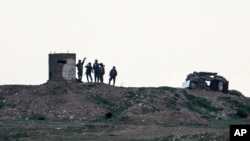Diplomatic efforts are continuing to avert a crisis between Ankara and Washington over a threatened Turkish offensive against U.S.-backed Syrian Kurdish forces. But analysts warn mixed messages between the two NATO allies is complicating de-escalation efforts.
Turkish President Recep Tayyip Erdogan, speaking to supporters Monday, declared U.S. President Donald Trump had responded positively to the launch of an offensive against the Syrian Kurdish YPG militia.
Ankara accuses the YPG of being affiliated with the Kurdish rebel group PKK that has been waging a decades-long insurgency in Turkey.
On Monday, U.S. Ambassador on Syrian Affairs Jim Jeffrey appeared to contradict Erdogan.
“We think that any offensive into northeast Syria by anyone is a bad idea, and that was a position that I conveyed when I was in Ankara, that everybody from the president on down has conveyed,” said Jeffrey.
The YPG is a crucial ally in Washington’s war against the Islamic State. Around 2,000 U.S. soldiers are deployed with the militia in the region that is targeted by Ankara. Erdogan said the Kurdish militia would be ousted from the Euphrates River to the Iraqi frontier.
Stoking tensions, Turkish Interior Minister Suleyman Soylu dismissed U.S. warnings.
“The United States tried to hamper us in northern Iraq, and in Afrin and Syria," Soylu said Monday while visiting Pakistan. "And now, they will try to hamper us in the east of the Euphrates. Turkey did not let it happen back then, and we will not let it happen this time,” Soylu said.
“I cannot say whether it’s blackmail or a bluff,” said international relations professor Huseyin Bagci of Ankara’s Middle East Technical University, “Turkey could undertake the military operation, the capability is there, and the fighting morale is there. The question is when and how it will carry out this military operation.”
“Probably the Kurdish forces they will be withdrawn from the area,” he added, “probably the Americans will negotiate till the last minute to satisfy Turkish expectations, or we will see for the first time a clash between two NATO countries, two strategic allies, everything is open.”
In an initiative backed by Washington a delegation of Iraqi-Kurdish supported Rojava peshmerga forces met Sunday with representatives of the YPG and its political wing the PYD.
Washington is touting the peshmerga force as a potential buffer between the YPG and the Turkish frontier. “One somewhat related thing is the Rojava Peshmerga deployment across the (Syrian) border. That was done with our understanding,” said Ambassador Jeffrey.
But the PYD and YPG reportedly rejected the offer. Observers say deep mistrust exists between the Iraqi and Syrian Kurdish forces.
Such a move would also have been likely to be rejected by Ankara. “Why should Turkey trust the peshmergas of northern Iraq?“ said Bagci, “No more Kurds would be allowed to be part of this game.
"The peshmerga Kurds if they tried to be a buffer zone, would be treated equally (by Ankara) as terrorists as the YPG,” he added.
Turkish domestic politics could also be a complicating factor in de-escalation efforts, with critical local elections due in March. Turkey is facing economic recession, and opinion polls indicate Erdogan’s ruling AKP Party is hemorrhaging votes.
“The timing of this military campaign in Syria, smacks of populism,” said analyst Atilla Yesilada of Global Source Partners. “Do we need to do this in the middle of winter and when relations with America are shaky. The timing suggests the AKP may be back to its old methods of garnering votes by appealing to nationalists and Turkish ethnic sentiments, and it's a dangerous game.”
Turkish-U.S. relations are still recovering from a crisis earlier this year when the Trump administration hit Ankara with financial sanctions that resulted in a collapse in the Turkish currency.
Washington has lifted its sanctions, but the Turkish economy remains fragile. The repercussions of a Turkish military operation into Syria could be severe.
“That would be a very significant threat,” said economist Inan Demir of Nomura Securities.
“If we see an accidental clash in Northern Syria (between U.S. and Turkish forces),” he added, “if that leads to the U.S. again considering sanctions on Turkey, which might be due to various issues, and there is no shortage of outstanding issues between the two countries. I would think the markets then again go back to price in a very negative situation for Turkey and lira.”
Given the high stakes, analysts predict bilateral diplomatic efforts are likely to intensify.
“Until the last minute both sides will try to avoid any confrontation and reduce the risk at the moment,” said Bagci, “the tension is getting high at least from the Turkish side, and we will see how the Americans will respond.”







